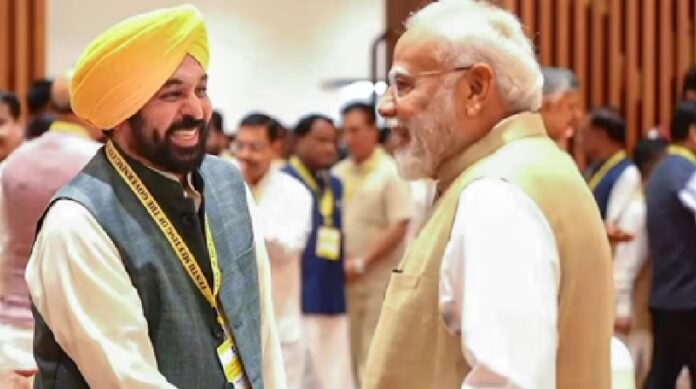
Chandigarh: Punjab Chief Minister Bhagwant Singh Mann, during the 10th Governing Council meeting of NITI Aayog, raised critical issues concerning water rights, industrial incentives, border development, and pending financial dues. Mann urged Prime Minister Narendra Modi to address these concerns to ensure equitable treatment for the state.
Water rights and Yamuna-Sutlej link
Mann emphasised Punjab’s severe water scarcity, asserting that the state has no surplus water to share. He proposed constructing the Yamuna-Sutlej Link (YSL) canal instead of the Sutlej-Yamuna Link (SYL) canal, noting that Punjab’s rivers—Ravi, Beas, and Sutlej—are already in deficit. Citing a 1954 agreement between the erstwhile Punjab and Uttar Pradesh, he highlighted Punjab’s entitlement to two-thirds of Yamuna waters. Mann pointed out that post-1966 reorganisation, Punjab’s claim to Yamuna waters was ignored, unlike the waters of Ravi and Beas, which were allocated to Haryana. He urged the inclusion of Punjab in negotiations for Yamuna water allocation and the construction of storage structures to prevent wastage.
Bhakra Beas Management Board (BBMB) concerns
Mann accused the BBMB of bias, alleging it disregarded Punjab’s interests by releasing 8,500 cusecs of water to Haryana despite Punjab’s objections and an actual requirement of only 1,700 cusecs. He noted that Punjab’s groundwater reserves are critically depleted, with 76.1% of the state’s blocks over-exploited—the highest in India. The CM called for BBMB to adhere to legal provisions, optimise resource use, and ensure transparency in its operations. He also raised concerns about the marginalisation of Punjab officers within BBMB and requested corrective measures.
Security at Bhakra Nangal Dam
Opposing the Ministry of Power’s decision to deploy the Central Industrial Security Force (CISF) for Bhakra Nangal Dam security, Mann argued that the existing state-managed security system is sufficient. He called for the immediate revocation of this decision, citing it as an infringement on Punjab’s rights over the dam.
Chandigarh Administration representation
Mann demanded that Punjab’s 60:40 representation ratio in the Chandigarh Administration be restored, criticising the increasing appointments from AGMUT and DANICS cadres. He urged the withdrawal of amendments allowing external appointments, emphasising that Punjab’s reduced representation in its own capital undermines cooperative federalism.
Financial and developmental demands
The CM sought the release of Rs 938.26 crore in pending arrears under the Post-Matric Scholarship Scheme for Scheduled Caste students for 2017–20, highlighting Punjab’s 31.94% SC population—the highest in India. He also requested Rs 600 crore for desilting the Harike Headworks, a critical reservoir impacted by sedimentation, to prevent flooding and ensure water supply to southwest Punjab and Rajasthan.
Mann proposed an Economic Corridor along the Delhi-Katra Expressway and a Special Economic Zone (SEZ) to boost Punjab’s industrial ecosystem. He also sought a Global Manufacturing Hub along the Bharat Mala corridor, sector-specific export zones in Jalandhar, Amritsar, Ludhiana, and Mohali, and royalty-free coal supply from PSPCL’s Pachwara mine to independent power producers supplying Punjab.
Border area development
To support Punjab’s border districts, Mann requested a special industrial package, infrastructure grants, and an increase in farmer compensation from Rs 10,000 to Rs 30,000 per acre annually for land between the border and the fence. He also sought the restoration of the daily allowance for Border Wing Home Guards (from Rs 45 to Rs 655) and Rs 2,829 crore to combat drug trafficking and enhance border security, including 50 additional drone-jamming systems.
Agricultural and economic reforms
To promote crop diversification, Mann proposed a Rs 17,500 per hectare incentive for maize to replace paddy, alongside support for BT-III cotton and agro-processing units. He also requested increased foodgrain allocations under the National Food Security Act and expanded godown capacity.
Punjab’s vision for Viksit Bharat
Reaffirming Punjab’s commitment to Viksit Bharat @2047, Mann outlined the state’s Vision 2047, targeting over 8% annual GDP growth through industrial and service-led development. He highlighted initiatives like doorstep delivery of 406 citizen services, Aam Aadmi Clinics serving over 3.34 crore patients, and the Sadak Surakhya Force, which reduced road fatalities by 10%.
Educational reforms include 118 Schools of Eminence, teacher training in Singapore and Finland, and the Business Blasters programme. Additionally, 33% job reservations for women and 13 crore free bus rides reflect Punjab’s focus on inclusive development.
Mann concluded by urging the Union government to reconsider unilateral borrowing limits under Article 293, include cesses and surcharges in the divisible pool, and increase vertical devolution to 50%. He reaffirmed Punjab’s dedication to cooperative federalism and its role in building a prosperous India by 2047.







